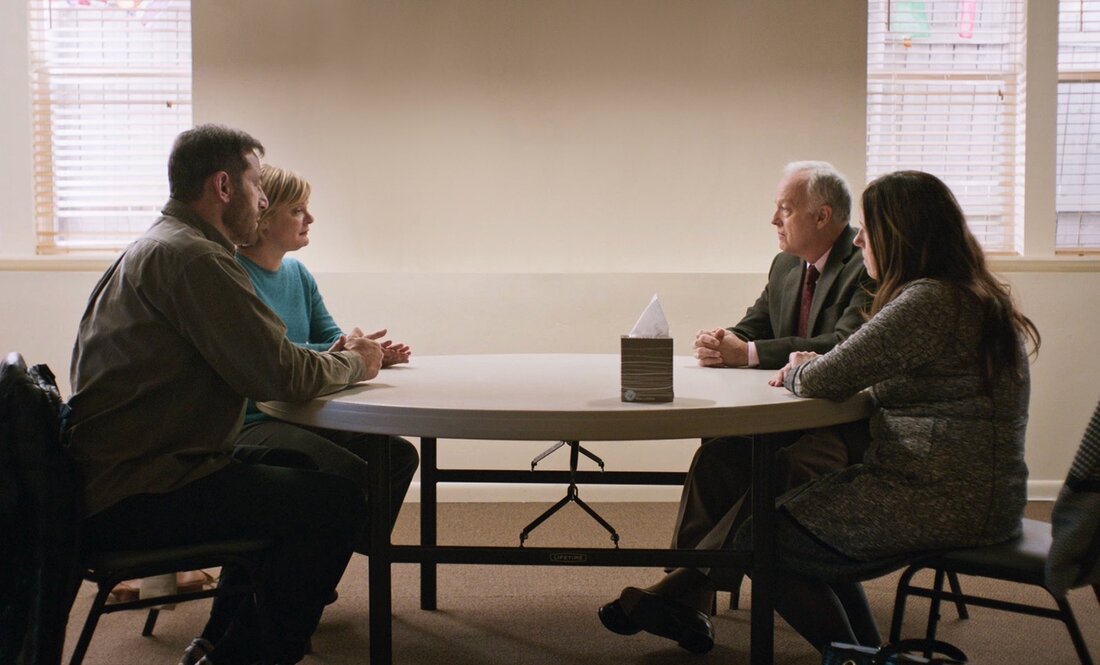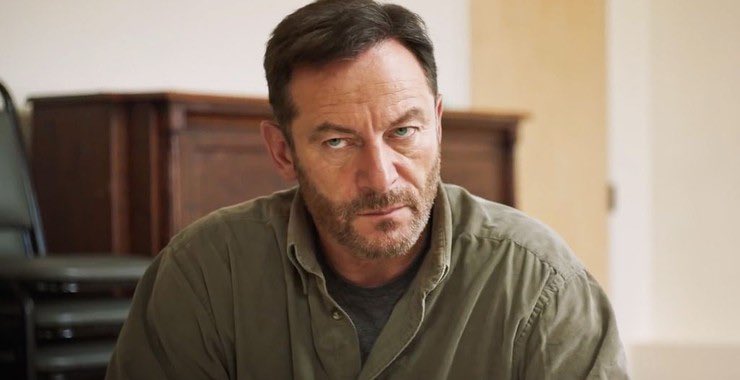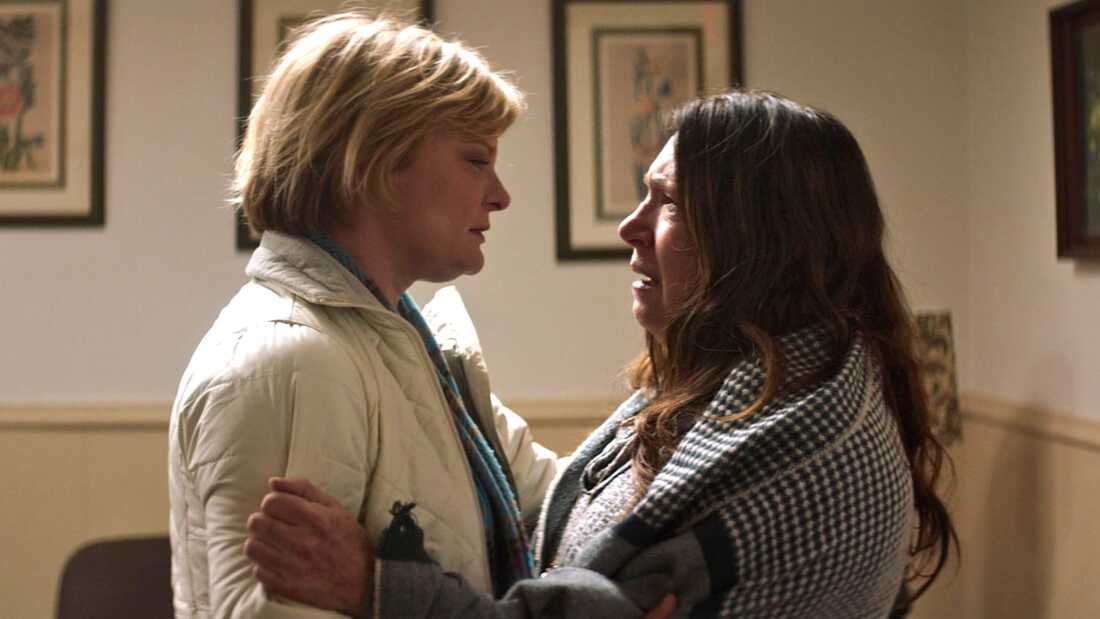|
Jason Isaacs, Martha Plimpton, Reed Birney, and Ann Dowd in Mass (2021) Fran Kranz’s searing directorial debut Mass explores the aftermath of a school shooting from the different perspectives of two couples in mourning. A conversation piece through and through, Mass is carried by four powerful performances of heart shattering magnitude. Set almost entirely in one room, the dialogue takes center stage with a fly-on-the-wall level of intimacy. Jay and Gail (played by Jason Isaacs and Martha Plimpton) agree to meet with Richard and Linda (played by Reed Birney and Ann Dowd) to gain a semblance of closure after a tragedy involving the sons of both sets of parents. Everyone wants to heal. Everyone wants to move forward with a cathartic release. Is this meeting how to go about it? The families’ stories play out in the vein of a stage production, with each actor ready to partake in the collaborative exercise. While the stagy directions interrupt the flow of conversation at times, the magnificently openhearted ensemble cast make Mass a resonating punch in the gut. It’s a moving story about grief, forgiveness, and the unflinching emotional journey towards acceptance. The film opens with the interior of a church, a calm before the storm as a back room is being set up for what’s bound to be an emotional conversation. Judy (a totally endearing Breeda Wool) arranges for a table with some chairs in the center; coffee and snacks tucked away at another table in the corner. She constantly asks if this setup is ok, if they’ll need anything else. Kendra (Michelle N. Carter), a mediator for one of the families, rearranges the chairs so that two are on either side of the table. She places a tissue box in the center. There’s an air of uncertainty hanging over the room. The details in Mass say so much. The lived-in buildup to the main event of this film creates a lot of tension and nervous anticipation for four-way dialogue. There’s an awkwardness and hesitance when both couples walk into the room. While Mass is of course a dialogue-heavy piece, so much is said in what the characters are suppressing. It’s understandable for them to awkwardly step around the traumatic incident that has brought them together in the first place. Each of their grief manifests in different ways. How do they begin addressing the grief they have experienced for years? The conversation takes shape in a way unbeknownst to everyone in the room. All they know is what happened, and how they feel about it. The characters are developed through the pieces of their lives that they choose to share with one another. Kranz trusts the actors entirely to carry a conversation with small details, silences and glances. Through their performances, the aftermath of the shooting are revealed. Public statements (and lack thereof), lawsuits, and letters fall under emotional scrutiny. One of the strongest features of this film is that it unfolds from a place where life has come to a halt. Mass is about four people in a room, each bringing their own perspective to the table which moves the conversation in often erratic ways. At its worst, the dialogue feels a little too staged and orchestrated. But ultimately the choreography of words falls in line with how each character walks into that room with some impulse to say their piece. Even if it may not come out the way they envision. Jason Isaacs in Mass (2021) Martha Plimpton and Ann Dowd in Mass (2021) Jay and Gail walk in full of blame in their hearts. Ready to assign Richard and Linda with the burden of guilt. For years since the shooting, Jay and Gail have understandably vilified this other couple to the point of not considering them as capable of human emotion. Richard and Linda walk in with fear and uncertainty scattered in their eyes. It’s a compelling contrast to Jay and Gail who appear to have a more purposeful approach, wanting answers that Richard and Linda don’t have. All four performances excel at capturing the unspoken tension and differing manifestations of heartache. Jason Isaacs delivers far and away his best performance to date. A seething fissure of emotions that stuns when reaching the surface. Being less familiar with Martha Plimpton’s work, her fantastic performance is a great reminder of her talent. You can tell that when Gail walks into the room, she’s doing so with purpose in her eyes. But over the course of the conversation she loses grip on how she’s going to achieve any semblance of a satisfying outcome. It’s heartbreaking to watch. Reed Birney has the least showy role of the quartet, which makes his work even more impressive as his impact is quietly devastating. Then there’s the great Ann Dowd. A magnetic force of nature who somehow outdoes herself as Linda, revealing new depths of her talent especially when in one-on-one correspondence with Gail.
Fran Kranz’s direction lives in the moment and stays with the characters. There are no flashbacks to the past, a smart move on Kranz’s part. Once the conversation begins, the only break from the room is an occasional image of a mountain landscape; front and center, a ribbon tied to a fence is drifting in the wind. It appears and reappears in what feels like random moments. In retrospect, perhaps a ribbon of awareness, a symbol of love and support without uttering a word. Often with grief it is hard to find the words to explain its all-consuming nature. Mass excels at showing people from opposite sides of a tragedy come together for one moment in time when healing and forgiveness feel possible. There is no telling how their future correspondences will be, and while each individual has their own process, the power of seeing them hold onto one another’s words in the remnants of grief is so deeply moving. Driven by four tremendous performances, Mass is an urgent writing-directing debut sparking resonating conversation and empathy. Mass releases theatrically across Canada on October 15th.
0 Comments
Leave a Reply. |
Archives
June 2024
Categories |




 RSS Feed
RSS Feed